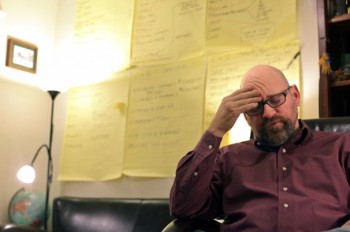Bruen gradually discovered dozens of similar sites offering disturbing variations — attacks on drunken women, on lesbians, on schoolgirls — to anyone with a credit card. Some made clear that the clips were fictional, but other sites had the word “real” in their titles. At least a few touted videos that he feared might show actual crimes.
That is especially true for sites offering illicit or controversial content, studies have found. As a result, although governments have increasingly powerful tools for tracking individual behavior on the Internet, it’s harder than ever for private citizens to learn who is responsible for online content, no matter how objectionable.
To Bruen, this is the dark side of Internet privacy.
“That’s not privacy. That’s secrecy,” said Bruen, 42, a security fellow at the Digital Citizens Alliance, a Washington-based advocacy group that combats online crime. “That’s corporate secrecy.”
The desire for sunshine is at odds with the libertarian ethos of cyberspace, where free speech often has been understood to include the freedom to share content anonymously. Bruen seeks a finer line that, while shielding personal conversations and other private behavior, would demand those selling content to accept a measure of accountability by making their identities known.
That long has been required by the Internet Corporation for Assigned Names and Numbers, a California-based nonprofit group that, under contract with the U.S. Commerce Department, has broad authority over the issuing of Web addresses worldwide. The group, typically called by its acronym, ICANN, requires that site operators provide “accurate and reliable contact details” but has struggled to enforce compliance amid the transnational lawlessness of cyberspace.
An ICANN study released in September found massive problems with contact information throughout the Internet. Among “adult” Web sites, nearly half used services to mask the identities of site operators or listed no contact number at all. When investigators attempted to reach site operators whose numbers were listed, the effort was successful for less than 6 percent of the “adult” sites surveyed.
“In principle, the information is supposed to be accurate,” said Stephen D. Crocker, chairman of ICANN’s board. Yet he acknowledged that it often is not, with the “dark corners” of the Internet most resistant to efforts at accountability.
For Rapetube.org, the official contact information listed a man with an East Asian last name, a French phone number and an e-mail address issued by a Chinese company. When Bruen sent e-mails, they bounced back as “undeliverable.” When he called the phone number, nobody answered.
Still, whoever operated the site remained active, promising in text posted amid pictures of bound, sometimes bloodied women that there would be “regular updates” to what it claimed was “the biggest rape porn site for violent sex videos.”
When activists against domestic violence in 2001 discovered a site called wifebeatersunion.com — it featured an animated image of a fist punching a woman’s face — there was enough information available to lodge complaints that eventually got the site shut down.
“It felt really good to take some action,” said Cindy Southworth of the National Network to End Domestic Violence. “If there is horrible, hateful content out there, it would be useful to know who hosts it.”
More recently, pressure from activists and advertisers persuaded Facebook in May to crack down on what it called expressions of “gender-based hate.” But such tactics have little chance of success when protesters can’t figure out whom to target in their protests.
The declining reliability of the Whois database is quietly embraced by many privacy advocates, who see the forced provision of contact information as contrary to free speech protections. U.S. courts recognize a right to speak anonymously as central to the First Amendment, on the grounds that voicing controversial ideas can be dangerous.
“We benefit from creating breathing room for anonymous and pseudonymous content,” said Eric Goldman, a law professor at Santa Clara University, in Silicon Valley. “Some categories of highly valuable information to society are especially susceptible to legal threats, and allowing content publication without attribution can help that content see the light of day.”
But courts also distinguish among kinds of speech, with pornography receiving less protection than, for example, political commentary or literature.
Most nude images of people younger than 18 are illegal to record, share or view. Some activists for women’s rights in recent years have been pushing for legal sanctions against non-consensual pornography — often called “revenge porn” — in which pictures or videos of sexual acts are uploaded to Web sites after a relationship ends, typically to embarrass a former romantic partner.
“Here we have images of private people,” said Danielle Citron, a law professor at the University of Maryland. “The public has no legitimate right to know about that.”
In a world of more than a billion smartphones, clips of sexual encounters recorded by bystanders are also increasingly appearing online. Some of these depict consensual acts, but others are from assaults, as was the case with video last year of a 16-year-old girl in Steubenville, Ohio, who was raped while intoxicated.






